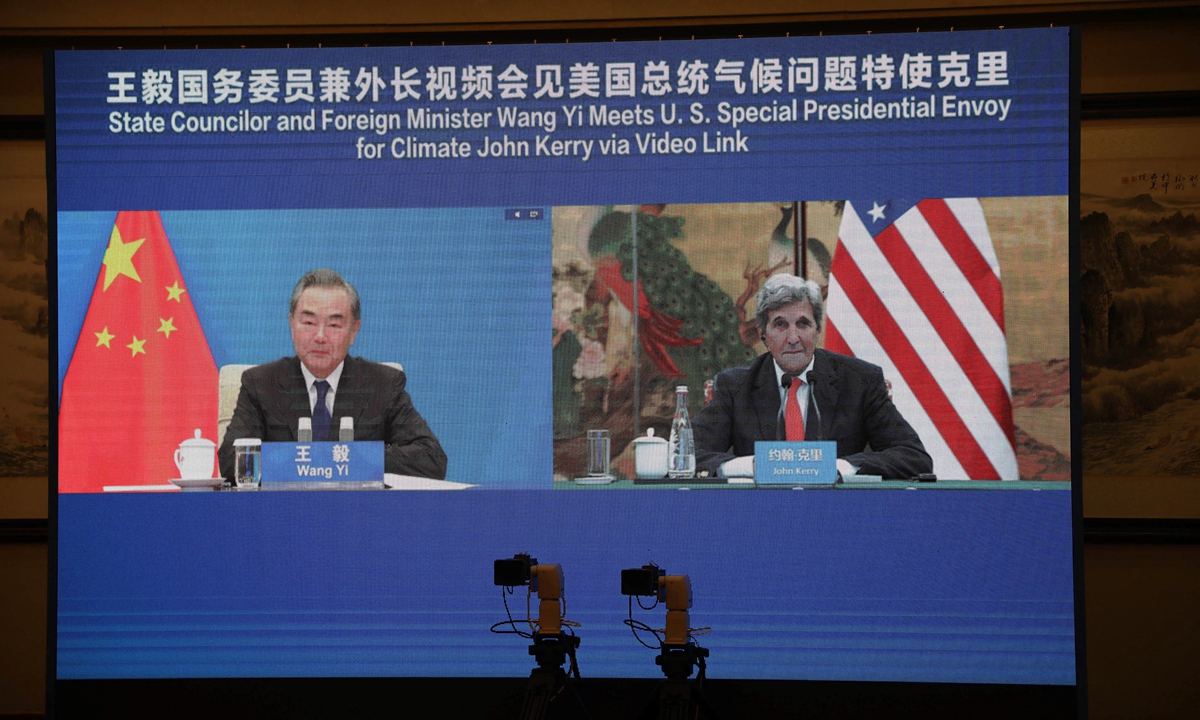
Chinese State Councilor and Foreign Minister Wang Yi meets with the US Special Presidential Envoy for Climate John Kerry via video link on Wednesday. Photo: AFP
US Special Presidential Envoy for Climate John Kerry is on his second visit to China this year, hoping to promote China-US cooperation on the climate issue. As the climate issue is a common concern of all mankind, Beijing and Washington jointly promoting the full implementation of the Paris Agreement benefits not only the two countries, but also the entire world.
However, US expectations - separating the cooperation on climate issue from the entire China-US ties, giving such joint work a special hype in disregard of the overwhelming complexity of other aspects of the bilateral relationship, making the Joe Biden administration look righteous and reasonable through the lens of climate cooperation, helping the administration win more points politically - seem quite absurd.
The overall US policy toward China has been so wicked. It has imposed a whole-of-government and wide-scale crackdown on China. Then the US suddenly put on a friendly face on the climate issue, inviting China to cooperate with it as if nothing has ever happened. The US wishes to ask China to make new concessions that go beyond the latter's own promises to coordinate US leadership. As Chinese people often ask, "What on earth are you talking about?"
The US strategic containment against China has severely divided the world and threatened China's long-term security. Objectively speaking, the US has destroyed the foundation for the world to do something great together. The COVID-19 pandemic is surging across the world but countries are acting in their own ways. This is the result of political antagonism in today's world.
The US is, on the one hand, making the utmost effort to divide the world, while on the other, building a drawbridge over the huge gap among the major powers. The rope of the drawbridge is held in Washington's hand. The US lowers the drawbridge when it needs it, and raises it up when it doesn't need it any more. It shows Washington's unscrupulous desire to control the world. Is there any reason for China to let the US get whatever it wants?
China and the US can work together on the climate issue and carry out necessary cooperation. But it is obviously hard for the entire Chinese society to accept placing such cooperation in the arrogant logic of the US' China policy of "competition, cooperation, and confrontation," or letting the US arbitrarily define the political implications of China-US cooperation on the climate issue. The US lacks both morality and justice to do so, and it lacks a compelling force to ask China to offer what the US wants.
Cooperation must be mutually beneficial. This is both the principle of sticking to the facts and a strategic morality. If the US continues its comprehensive containment of China, and keeps pushing the hostility between the two countries, it will create constant pollution in the space for bilateral cooperation. This is common sense and conventional wisdom. Many of the US policies toward China are zero-sum, leaving the world a strong impression that the US would not be satisfied until it suffocates China's development. Under such circumstances, Chinese society's willingness to cooperate with the US can hardly be immune to the impact of vigilance against the US.
Washington should not have thought that showing a little willingness toward cooperation in its comprehensive containment of Beijing is "mercy" to China. If they really think that way, they will find no grateful Chinese.
When it comes to climate, China believes that cooperation is necessary, as stated earlier. But if the cooperation has other extended meanings aimed at boosting Washington's political gains, such cooperation must be considered in the big picture of China-US ties. As China is a powerful major country, it has unique influence in many international affairs around the globe. No matter in which field the US hopes to cooperate with China and at the same time promote the US benefits, such joint work must be linked with the entire China-US relationship.
China wants to improve its ties with the US, but China will not do everything to please the US. The major power relationship between China and the US should be on an equal footing and follow the basic principle of mutual respect. If the US ever attempts to treat China forcefully in this logic - asking China to keep putting up good shows, ones that are thought good enough to satisfy the US, then the US returns the favor by relaxing tensions - it is totally wrong. This is not the way the Chinese people like to deal with other countries, and we do not want such "improvement" in China-US relations at all.

